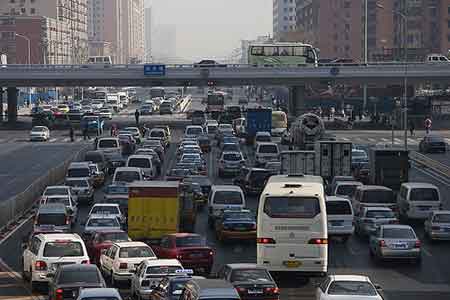 |
|
File photo of Beijing traffic. The IBM Commuter Pain Index survey ranks the emotional and economic toll of commuting in 20 major cities around the world.(Agencies) |
|
Commuters in Toronto and Montreal may spend a lot of time in their cars, but a new survey shows they have a relatively stress-free commute compared with others. The IBM Commuter Pain Index survey ranks the emotional and economic toll of commuting in 20 major cities around the world. Toronto and Montreal were both a part of the survey with the latter finishing at the bottom of the list and Toronto finishing fifth from the bottom. Mexico City topped the list with Shenzhen, Beijing, Nairobi and Johannesburg rounding out the top five. New York finished one point above Toronto. "Commuting doesn't occur in a vacuum," said Naveen Lamba, IBM's global intelligent transportation expert, in a statement. "A person's emotional response to the daily commute is coloured by many factors — pertaining both to traffic congestion as well as to other, unrelated, issues. This year's survey indicates drivers in cities around the world are much more unsettled and anxious compared with 2010." The survey includes questions about commuting time, time spent in traffic, the price of gas, stress, anger and how traffic affects work. Globally, 42 per cent of people say their stress level has increased and 35 per cent say they get angry because of traffic. While 23 per cent of people in Toronto say congestion is better, 40 per cent are more stressed because of congestion. IBM surveyed more than 8,000 people on six continents with the majority saying traffic has become worse in the last three years. It points out 40 per cent of commuters say improved public transit would help and the number of people taking transit is up in most places. More people taking transit is a good thing because one expert says cities can't expect to solve the problem by building more roads. "We can't simply build our way out of congestion no matter which city," said Vinodh Swaminathan, IBM's director of intelligent transportation systems, in a statement. "In order to improve traffic flow and congestion, cities need to move beyond knowing and reacting; they have to find ways to anticipate and avoid situations that cause congestion that could turn the world into one giant parking lot." (Read by Nelly Min. Nelly Min is a journalist at the China Daily Website.) (Agencies)
|
多倫多和蒙特利爾的通勤上班族花在路上的時間可能就不短了,但一項最新調(diào)查表明,和其它城市相比,這真是小巫見大巫。 IBM近日發(fā)布“通勤痛苦指數(shù)”,針對全球20個大城市的通勤損失進(jìn)行了調(diào)查,包括精神損失和經(jīng)濟損失。 多倫多和蒙特利爾也在調(diào)查之列,蒙特利爾排名墊底,多倫多排在倒數(shù)第五。 通勤壓力最大的五個城市分別為墨西哥城、深圳、北京、內(nèi)羅畢、和約翰內(nèi)斯堡。紐約排在倒數(shù)第六。 IBM全球智能交通專家納文·蘭巴在聲明中說:“通勤與其它因素互相影響。” “人們對每日通勤的情感反應(yīng)受到很多因素的影響,和交通擁堵以及其它看似不相干的問題都有關(guān)系。從今年的調(diào)查來看,全球的司機都比去年更不淡定、更焦躁了。” 調(diào)查問題包括通勤時間、交通耗時、油價、通勤壓力、交通狀況導(dǎo)致的憤怒情緒、交通狀況對工作的影響等。 全球來看,42%的受訪者認(rèn)為通勤壓力上升,35%認(rèn)為交通問題給心里添堵。 而有23%的多倫多人認(rèn)為交通擁堵有所改善,另有40%認(rèn)為交通擁堵使自己壓力更大了。 IBM對來自六大洲的八千多人進(jìn)行了調(diào)查,多數(shù)受訪者認(rèn)為在過去三年中交通狀況變差了。調(diào)查指出,40%的通勤者認(rèn)為改善公共交通有好處,在大多數(shù)受訪地區(qū),乘坐公共交通的人數(shù)也有上升。 乘坐公共交通的人數(shù)增加是件好事。有專家稱,解決城市交通問題不能靠多修路。 IBM智能交通系統(tǒng)總監(jiān)維諾德·斯瓦米納森在聲明中說:“不管在哪里,解決交通擁堵都不能靠修路。” “為了疏導(dǎo)車流,減少擁堵,城市不能每次都做事后諸葛亮,而是要想法預(yù)見并避免擁堵的原因,不然整個地球會變成一個巨無霸停車場。” 相關(guān)閱讀 (中國日報網(wǎng)英語點津 Julie 編輯:馮明惠) |
|
Vocabulary: commuter:a person who travels to work over an appreciable distance, usually from the suburbs to the centre of a city(乘車上下班者,通勤者) vacuum: a state of being sealed off from external or environmental influences; isolation(跟外界隔絕的)孤立狀態(tài) colour: to influence or distort(渲染,文飾,歪曲,影響) parking lot: 停車場 |
